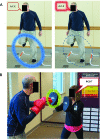Cognitive Contributions to Freezing of Gait in Parkinson Disease: Implications for Physical Rehabilitation
- PMID: 26381808
- PMCID: PMC4858659
- DOI: 10.2522/ptj.20140603
Cognitive Contributions to Freezing of Gait in Parkinson Disease: Implications for Physical Rehabilitation
Abstract
People with Parkinson disease (PD) who show freezing of gait also have dysfunction in cognitive domains that interact with mobility. Specifically, freezing of gait is associated with executive dysfunction involving response inhibition, divided attention or switching attention, and visuospatial function. The neural control impairments leading to freezing of gait have recently been attributed to higher-level, executive and attentional cortical processes involved in coordinating posture and gait rather than to lower-level, sensorimotor impairments. To date, rehabilitation for freezing of gait primarily has focused on compensatory mobility training to overcome freezing events, such as sensory cueing and voluntary step planning. Recently, a few interventions have focused on restitutive, rather than compensatory, therapy. Given the documented impairments in executive function specific to patients with PD who freeze and increasing evidence of overlap between cognitive and motor function, incorporating cognitive challenges with mobility training may have important benefits for patients with freezing of gait. Thus, a novel theoretical framework is proposed for exercise interventions that jointly address both the specific cognitive and mobility challenges of people with PD who freeze.
© 2016 American Physical Therapy Association.
Figures


References
-
- Giladi N, Kao R, Fahn S. Freezing phenomenon in patients with parkinsonian syndromes. Mov Disord. 1997;12:302–305. - PubMed
-
- Macht M, Kaussner Y, Möller JC, et al. Predictors of freezing in Parkinson's disease: a survey of 6,620 patients. Mov Disord. 2007;22:953–956. - PubMed
-
- Nonnekes J, Janssen AM, Mensink SH, et al. Short rapid steps to provoke freezing of gait in Parkinson's disease. J Neurol. 2014;261:1763–1767. - PubMed
-
- Snijders AH, Haaxma CA, Hagen YJ, et al. Freezer or non-freezer: clinical assessment of freezing of gait. Parkinsonism Relat Disord. 2012;18:149–154. - PubMed
MeSH terms
Grants and funding
LinkOut - more resources
Full Text Sources
Other Literature Sources
Medical

